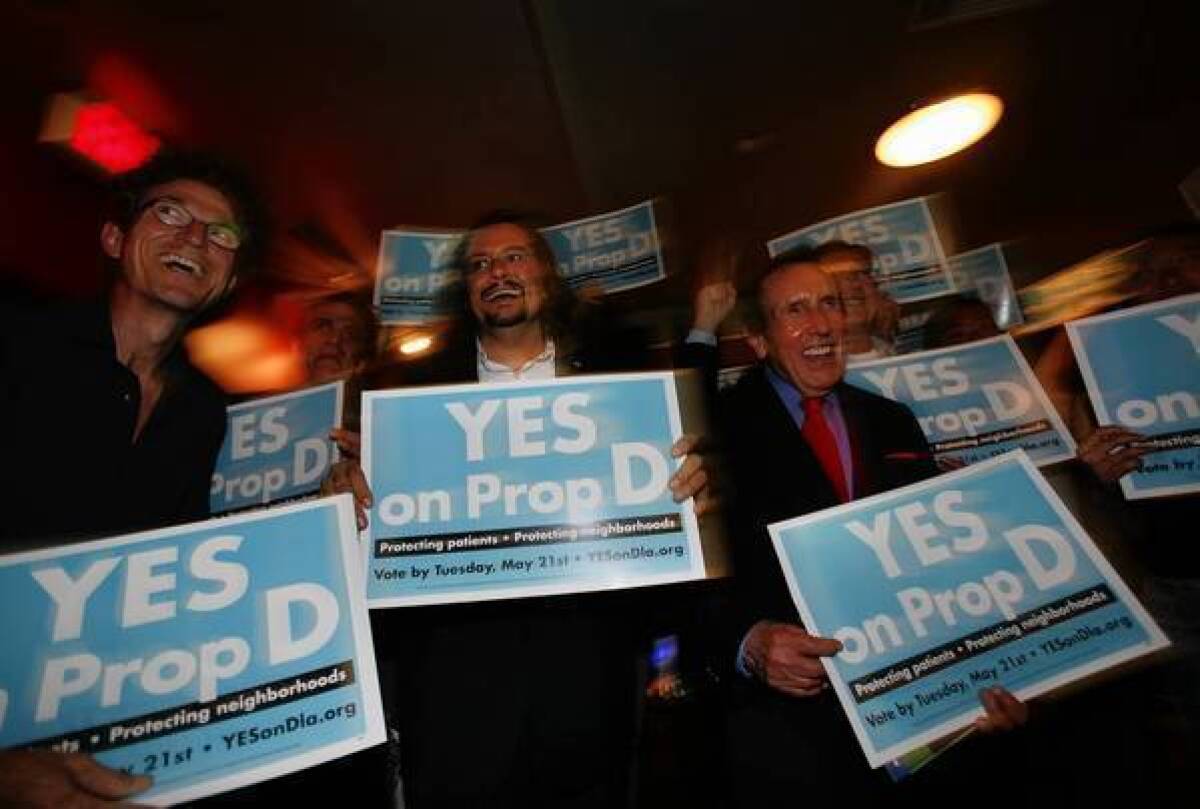Measure to limit medicinal pot shops in L.A. is leading

After years of futile attempts by lawmakers to regulate the medical marijuana industry in Los Angeles, a ballot measure to sharply limit the number of pot dispensaries in the city was leading in early returns Tuesday.
Proposition D would reduce the number of pot shops to about 130 from around 700 by allowing only those that opened before the adoption of a failed 2007 city moratorium on new dispensaries. A rival initiative, Measure F, which would have allowed an unlimited number of dispensaries to operate, was trailing. Both measures would raise taxes on medical marijuana sales 20%.
Yami Bolanos, a Proposition D supporter who opened PureLife Alternative Wellness Center in 2006, cried with happiness as the first election results came in, saying she felt as though years of uncertainty about the future of medical marijuana in the city were coming to an end. “Voters had the heart to stand up for the patients like the City Council never did,” Bolanos said.
Live video analysis: Wednesday, noon to 2 p.m.
City Councilman Bill Rosendahl, a cancer patient and medical marijuana user who backed Proposition D, said the measure “takes us out of chaos.” He said the dispensaries that have been in the city since 2007 have showed that they are good actors. “They have lived with us,” he said.
Backers of Measure F, which called for additional regulations on dispensaries such as city audits and tests of cannabis for toxins, said they weren’t ready to give up.
David Welch, an attorney who supported that measure, said he was prepared to sue if Proposition D was declared the winner. He said the proposition was unconstitutional because it favored dispensaries based on an arbitrary date. He also predicted that Proposition D would be difficult to enforce, saying that many shops that opened after 2007 probably would continue to operate until the city identifies them and orders them closed. “The city has no idea who qualifies and who doesn’t,” Welch said.
The contentious campaign over how to regulate pot shops divided the city’s dispensaries, employees and customers, as well as the City Council.
Measure F supporters warned that Proposition D would create a monopoly for older shops and allow the rise of “pot superstores.” Backers of Proposition D, including a coalition of older shops and a labor union that has organized workers at many of them, cautioned that Measure F could lead to thousands of new dispensaries.
A third measure, Initiative Ordinance E, would have permitted only the older shops to remain open but without raising taxes. It was put on the ballot by the coalition of older shops and the dispensary employees union, but that coalition shifted its support to Proposition D after the council voted to put that measure on the ballot.
The stakes were raised this month when the California Supreme Court upheld the right of cities to ban dispensaries.
Supporters of both initiatives warned that if voters failed to pass one of the ballot measures, the city would be left with no law regulating medical marijuana and might be tempted to enact a total ban.
The City Council attempted a ban last year, voting 14 to 0 to outlaw over-the-counter sales of marijuana while allowing small groups of patients to grow the drug for their own use. It reversed the action after the coalition of older dispensaries and union workers qualified a measure for the ballot that would have repealed the ban.
At least one council member, Jose Huizar, has spoken of revisiting the ban now that cities have been given the authority to outlaw dispensaries.
L.A. has struggled for years to regulate dispensaries, in large part because of contradictory court rulings. The city is battling more than 60 lawsuits over its earlier attempts at regulation.
Los Angeles voters have generally supported the availability of medical marijuana.
In 1996, California became the first state to legalize medicinal use of pot, although subsequent state laws failed to make explicit how the drug should be distributed. In 2011, L.A. voters approved a ballot measure to tax sales.
Still, a USC Price/Los Angeles Times poll conducted this month found strong support for more regulation of pot shops, with 61% of respondents saying they felt the city should regulate dispensaries more than it currently does. In contrast, 13% said the city should regulate less, and 19% said regulation should not change.
The poll also found that 54% of voters supported a 20% tax increase on medical marijuana sales and 33% opposed it.
Many voters confessed to confusion over the differences among the ballot measures. “The pot stuff was hard,” said Sue Maberry, 64, of Silver Lake. She voted yes on Measure F because she believed Proposition D would create a monopoly.
Early returns also suggested voters favored a measure aimed at overturning Citizens United vs. Federal Election Commission, the Supreme Court ruling that corporations and unions have a 1st Amendment right to spend their money to influence voters.
The measure would “instruct” members of Congress from the Los Angeles area to support a constitutional amendment to change the law, although the lawmakers would not be bound by it.
More to Read
Sign up for Essential California
The most important California stories and recommendations in your inbox every morning.
You may occasionally receive promotional content from the Los Angeles Times.











